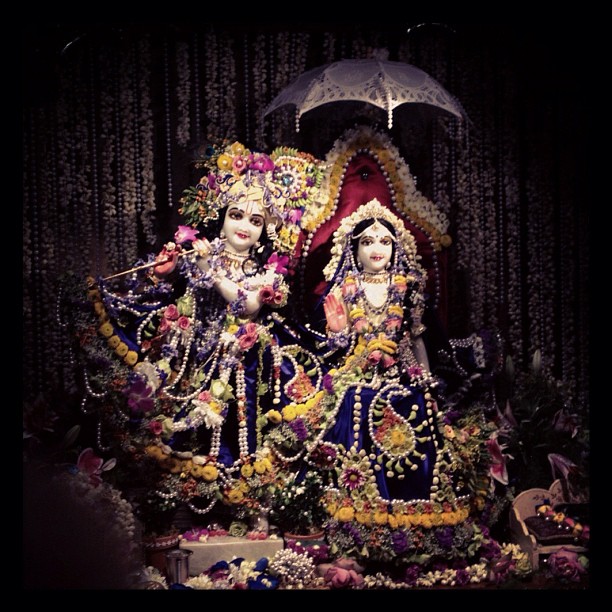Radhastami at The Bhakti Center
Waves of Devotion October 2nd, 2012

Podcast: Play in new window | Download (38.8MB)
Subscribe: RSS
Waves of Devotion October 2nd, 2012

Podcast: Play in new window | Download (38.8MB)
Subscribe: RSS
Waves of Devotion September 26th, 2012
The following is a recording of Dhanurdhara Swami’s lecture given on Tuesday, September 25, 2012, at the Bhakti Center in New York, entitled The Bhakti Story.
In The Bhakti Story, Dhanurdhara Swami narrates the first story from the classic 16th century work Brhad Bhagavatamrta, where the great saint Narada, at the famous Kumbha Mela gathering in India, begins his world search for the greatest bhakti-yogi.
Podcast: Play in new window | Download (26.1MB)
Subscribe: RSS
Waves of Devotion September 4th, 2012
Narada Bhakti Sutra
Sutra 4
yal labdhvā pumān siddho bhavaty amṛto bhavati tṛpto bhavati
Having attained divine love, a person becomes perfect, immortal and satisfied.
The first three verses introduced the subject of bhakti. In the next three verses, beginning here with text four, Sri Narada describes the effect of such divine love on the soul.
First he says that by it one becomes perfect. To understand why this is so, one must understand what dharma is. Dharma means duty. It also means essential nature, for unless we understand what we are made for (our essential, intrinsic nature), how can we understand what we are meant to do (our dharma or duty)? According to the bhakti tradition, the soul is part of the supreme consciousness. As all parts are meant to serve the whole, the dharma of the soul is bhakti — to selflessly serve God.
But what does this have to do with perfection?
Waves of Devotion August 29th, 2012
This is a wonderful short video of the Bhakti Immersion Retreat 2012 August 23- 26 with Dhanurdhara Swami, Raghunath, Visvambhar and others.
Waves of Devotion August 27th, 2012
During August 23-26, 2012, dozens joined Dhanurdhara Swami, Raghunatha, and Visvambhar and Vrinda Devi for a weekend of sat sanga, meditation, kirtan, and yoga at the Pumpkin Hollow Retreat Center in Craryville, New York.
The following pictures are just a glimpse of the activities that took place.
Waves of Devotion August 24th, 2012
Krishna-lila: How to Relish and Understand the Krishna Story
On August 14, 2012, Srila Dhanurdhara Swami gave a lecture entitled Krishna-lila: How to Relish and Understand the Krishna Story at The Bhakti Center in New York. The following is a recording of that talk.
Krishna-lila: How to Relish and Understand the Krishna Story
Podcast: Play in new window | Download (22.3MB)
Subscribe: RSS
Waves of Devotion August 23rd, 2012
Lotus Festival: The Bewilderment of Lord Brahma
On August 11, 2012, Srila Dhanurdhara Swami gave a lecture entitled The Bewilderment of Lord Brahma on the final day of a three day Sri Krishna Janmastami festival at The Bhakti Center in New York. The following is a recording of that talk.
Lotus Festival: The Bewilderment of Lord Brahma
Podcast: Play in new window | Download (14.5MB)
Subscribe: RSS
Waves of Devotion August 21st, 2012
Sri Krishna Janmastami
On August 9, 2012, Srila Dhanurdhara Swami gave a lecture about Sri Krishna Janmastami, the appearance day of Krishna, as part of a three day festival at The Bhakti Center in New York. The following is a recording of that talk.
Podcast: Play in new window | Download (15.7MB)
Subscribe: RSS
Waves of Devotion August 16th, 2012
Narada Bhakti Sutra
Sutra 3
amṛta-svarūpā ca
This pure love for God is eternal.
All spiritual paths, or yogas, are simply a means or practice (sadhana) to achieve a transcendent objective (sadhya). Bhakti, unlike other yogas, is not just a steppingstone to a goal but also the goal itself, the sadhya. By the practice of selfless devotion we attain the fruit of pure devotion, the only difference being their respective maturity. In contrast, the practice and goal of all other paths are quite at variance. For example, the jnani strives for moksa (liberation), a state of untroubled awareness, but his practice is vairagya, arduous renunciation. And like every other path, except bhakti, its mode of practice is relinquished upon accomplishment. To highlight that bhakti unlike other paths is not just an intermediary step to achieve something else but also what the practitioner is seeking to attain in perfection, Sri Narada asserts that bhakti is eternal. In implying that bhakti is the goal or ultimate attainment, Narada is following the authority of standard texts like the Taittiriya Upanishad, where the ultimate reality is described as rasa vai saha, a flow of pure and intense devotion.
Waves of Devotion July 27th, 2012
Narada Bhakti Sutra
Sutra 2
sā tv-asmin parama-prema-rūpā
The nature of bhakti is the topmost love for God.
The first verse of Narada Bhakti Sutra announced the subject of the book, implied bhakti’s superlative position, and hinted at the urgency to realize the self through the study and practice of bhakti. This second verse now defines the nature of such bhakti — it is the purest love for God.
Sri Rupa Goswami, a prominent 15th century successor of Sri Narada, thus defined bhakti as follows.
“True bhakti is activity not covered by any selfish desire and done with the exclusive intention to please God.”
Thus bhakti in its topmost form has two pertinent characteristics: it is free of all selfish motives, and it is focused upon God. It is easy to see that true devotion cannot be selfish, but why does it have to be for God?